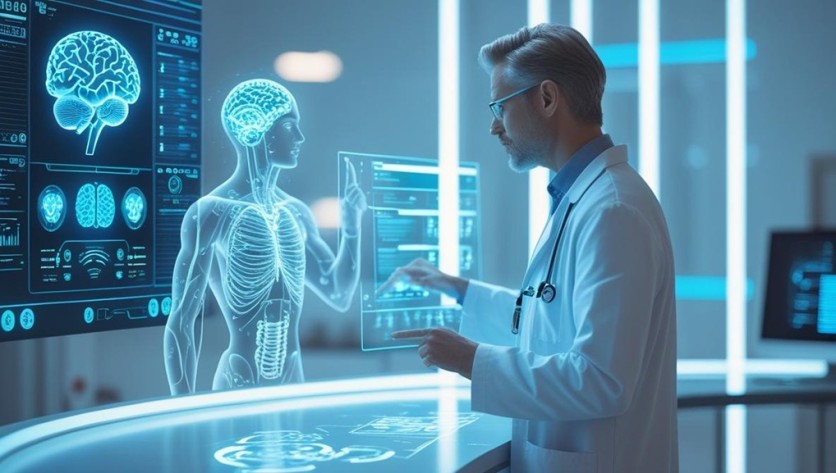
Today, data-driven decision-making processes are becoming increasingly important in the field of medicine.
According to a study conducted by the American Medical Association (AMA) in 2024, two out of three doctors use artificial intelligence in their clinical workflows.
The study found that doctors use AI in a wide range of areas, from translation services and summarizing scientific research to diagnostic support and patient-specific self-care recommendations.
The survey results, which included responses from over 1,200 doctors, also indicated that AI usage has increased significantly since 2023.
What does the AI revolution in medicine actually involve?
AI in Medicine: Deeper and Quicker Data Analysis
Medicine has always been a data-driven science. Diagnosis and therapy are based on examination results, imaging data, and blood tests.
The greatest shift with artificial intelligence is that it's no longer only physicians who can use and examine data; AI can also do this.
AI can analyze data much more thoroughly and quickly than a human, revealing deep connections between data points.
This can enable doctors who maximize the benefits of AI to function at an enhanced level—almost like "super doctors."
The support provided by artificial intelligence can increase accuracy in diagnosis, strengthen personalization in treatment planning, and make patient management more proactive.
Medical Fields Already Changed by Artificial Intelligence
Many sectors, including psychiatry, dentistry, dermatology, and ophthalmology, are already using artificial intelligence extensively.
Algorithms trained with deep learning, for instance, in dentistry can identify cavities the human eye might overlook, diagnose impacted teeth, and direct orthodontic treatment.
In dermatology, AI can analyze moles and predict the likelihood of malignancy with accuracy comparable to dermatologists.
Dermatologist Meltem Şentürk says that she recommends trustworthy AI-supported applications to some of her patients living abroad to monitor their moles and even uses artificial intelligence in the hair donor index methodology they developed to evaluate donor areas for hair transplantation.
Psychiatry is another area that gains much from artificial intelligence algorithms. Chatbots in this sector can evaluate emotional states and provide suitable support by examining users' written (text) and spoken (speech) data.
For instance, those who regularly use terms like "emptiness," "no way out," and "hopeless" can be flagged as having depressive tendencies and offered appropriate recommendations.
According to a study published in BMC Psychiatry in 2024, AI-based chatbots have been shown to be effective in short-term symptom relief for managing depression and anxiety.
AI is also achieving greater success each day in pharmacology, such as drug development and predicting drug interactions.
AI's Growing Role in Aesthetic and Surgical Medicine
Some AI systems used in aesthetic surgery and dermatology provide personalized recommendations based on measurements such as the ideal nose-tip angle, jawline contour, and eyebrow height.
Doctors then use this data to recommend transformations that reflect the patient's true anatomical potential.
As a result, data-driven recommendations are shaped by realistic expectations, which increases patient satisfaction.
Some AI-powered applications can even simulate post-operative outcomes before the surgery is performed.
Dental aesthetics is also benefiting from this transformation.
Invisalign's AI-supported systems analyze the patient's jaw structure and tooth positions to create personalized transparent aligner treatment plans.
Conclusion: The Future of Healthcare Is Already Here
How a doctor uses data—and the extent to which data is integrated into decision-making—has become a key factor in that doctor's success.
AI is increasingly serving as a powerful second brain for physicians.
Doctors who integrate AI effectively are improving diagnostic accuracy, reducing complication rates, and making better treatment decisions.
Patients, too, are actively using AI-powered tools to create personalized diet plans or visualize post-surgery results.
The future of medicine is no longer distant. It's already here.
ⓒ 2026 TECHTIMES.com All rights reserved. Do not reproduce without permission.





